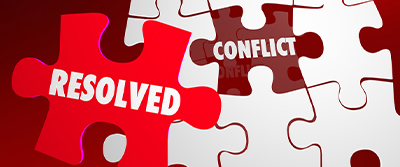Alternative Dispute Resolution (ADR) refers to any method of settling a dispute outside a courtroom. ADR includes mediation, negotiation, reconciliation, and arbitration.
Settling outside of the courtroom has many benefits, including faster settlements, lower costs of litigation, and more control for the parties involved to find a solution.
What Is Alternative Dispute Resolution or ADR?
Alternative Dispute Resolution provides alternative confidential methods of tackling legal disputes, which avoid going to court. The most common types of ADR are mediation and arbitration.
Can ADR Resolve Disputes?
Absolutely. Due to the informality and confidentiality, parties often feel more comfortable cutting to the heart of their arguments. Lawsuits in court often become mired with other issues and formalities that can make the disputes last longer. Mediation and arbitration allow the parties to just sit down and talk to each other to explore a way where all parties’ needs or met or to have a determination decided more quickly, depending on the type of ADR.
When Should You Use It?
Like all legal answers, “it depends.” In some types of cases, being denied access to the courts may result in a loss of your rights or actually make some disputes longer, not shorter. That said, transactions that involve confidential information may benefit from ADR since the disputes are not public information.
Many courts have ADR built into their lawsuit timeline as well. Many courts even require that certain types of cases go to non-binding mediation to at least explore all options before continuing with a lawsuit.
ADR is not suitable if an injunctive relief or a restraining order may be needed or the dispute involves only collections of monies. It may also not be suitable if there is an imbalance of power, such as a small trader who is in dispute with a large international corporation. Also consider that, unlike the legal system where the judges are employed by the government, arbitrators and mediators are typically paid separately which can result in a more expensive process.

Different Types of ADR
As outlined by the American Bar Association, there are many different kinds of alternative dispute resolution (ADR). Here are the most common forms.
Mediation
Mediation is an informal alternative to litigation. Mediators are trained individuals who guide negotiations to work out an agreement and settlement that both parties accept. Mediation is not binding and is used in a range of cases, from juvenile felonies to federal government negotiations.
Arbitration
Arbitration is a more formal process than mediation. An arbitrator is nominated by a qualified third party and is used to help negotiate between the two parties and find a solution. Arbitrators are usually used when there is technical knowledge needed or some international element. Arbitration runs as a tribunal process, and therefore the decision made is legally binding.
Settlement Conferences or Court-Mandated ADR
A settlement conference is a meeting where a magistrate or judge assigned to the case leads the process. The aim is to settle the dispute before a trial. Like mediation, a third neutral party helps those involved explore different options. But settlement conferences are usually shorter and have less opportunity for participation for the parties involved.
Community Dispute Resolution Programs
Community Dispute Resolution (CDR) Programs help resolve conflicts that arise in neighborhoods, everything from loud music to criminal assault. They exist in most American cities and are known by various names, such as Community Mediation Programs or Neighborhood Justice Centers.
CDR uses informal processes such as mediation to help resolve conflict outside of court, and staff are trained, community volunteers. Sometimes cases are referred to a community dispute resolution program by the court.
Advantages With ADR
ADR processes have several advantages. In most scenarios, a decision is made outside of court. However, they can also be used to explore the problem in preparation for going to court. Benefits include:
- Flexible
- Cost-efficient
- Time effective
- Less stressful
- Increases control over the process
- Preserves relationships
- Improves client-attorney relationships
- The ADR procedure is confidential
Risks In Using ADR
There are many benefits to using ADR. However, it is not without risks. To decide what is right for your individual case, you should contact a lawyer to assist you. Potential risks include:
- A reluctant opponent can make negotiations difficult
- It may result in lower compensation
- It can take a long time
- Getting supporting evidence from third parties is challenging
- Difficulty in securing restraining orders
- Difficulty in getting time-sensitive decisions
- Some ADR schemes are legally binding, which means that you won’t be able to take your case to court if you accept the decision from ADR but later change your mind.

Are The Decisions Legally Binding?
Some decisions involving ADR are legally binding, and others are not. It depends on the method used. For example, mediation is not legally binding until you sign a legal document, The mediator has no decision-making power.
However, arbitration is usually legally binding and enforceable in the same way as a court judgment. You can only appeal the decision in particular circumstances, such as if the arbitrator had an undisclosed conflict of interest. Court-mandated arbitrations are not typically binding and the parties can reject the arbitrator’s decision.
Do You Need A Lawyer To Participate In ADR?
For most forms of ADR, you are not required to have a lawyer involved. However, having a lawyer by your side will help you to secure a good outcome. Your lawyer can act as your counselor and advocate and will help to take away some of the stress involved in a legal dispute.
Deciding Which Is Best For You
Depending on the nature of your dispute, ADR can offer a lot of benefits. However, you should speak to a lawyer about your case so that they can advise you on the best course of action.
At Shakfeh Law LLC, we can provide you with the legal help you need to secure the best possible outcome for your case.
Need help with alternative dispute resolutions?
Contact us today or call (630) 517-5529.


